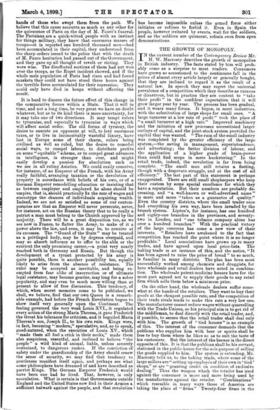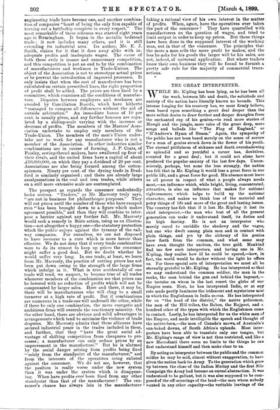THE GROWTH OF MONOPOLY.
IN the current number of the Contemporary Review Mr. H. W. Macrosty describes the growth of monopolies in British industry. The facts stated by him will prob- ably come as a surprise to most readers. Consumers have grown no accustomed to the continuous fall in the prices of almost every article largely or generally bought, that they are inclined to regard it as the result of a natural law. In speech they may regret the universal prevalence of a competition which they describe as ruinous or disastrous, but in practice they are content to "take their profit" in the confident expectation that it will grow larger year by year. The process has been gradual, and it wears many forms. It began, in most industries, with the substitution of large shops for small ones. "A large turnover at a low rate of profit" took the place of "a small turnover at a high rate." Improved machinery and the initiation of new processes necessitated larger outlays of capital, and the joint-stock system provided the capital that was wanted. "The ruin of the small industry was completed by the greater efficiency of the large system,—the saving in management, superintendence, and advertising ; the better division of labour, and the application of a higher grade of brain-power than could find scope in mere huckstering." In the retail trade, indeed, the revolution is far from being complete. "The small man still retains a footing, though with a desperate struggle, and at the cost of all efficiency." The last part of this statement is perhaps exaggerated. There are still small shopkeepers who keep their custom by some special excellence for which they have a reputation. But their numbers are probably de- creasing, and "a well-known or well-advertised name" is more and more "taken as a guarantee of quality." Even the country districts, where the small trader once had everything his own way, have been invaded by the branch system. Lipton's, for instance, has one hundred and eighty-one branches in the provinces, and seventy- two in London, and "one tobacco company alone has over a hundred branches." With the practical victory of the large concerns has come a new view of their interests. "Retailers have awakened to the fact that competition has reached the point where it is no longer profitable." Local associations have grown up in many trades, and have agreed upon local price-lists. The baking trade is an instance of this, and the notice, "It has been agreed to raise the price of bread" to so much, is familiar in many districts. The plan has been most successfully worked among chemists and druggists, for here wholesale and retail dealers have acted in combina- tion. The wholesale patent-medicine houses have for the most part agreed not to supply their goods to any retail firm which sells them below a minimum price.
On the other hand, the wholesale dealers suffer some- what at the hands of the retailers. They want to buy their goods at the cheapest possible rate, and the competition of their trade rivals tends to make this rate a very low one. The manufacturer cannot reduce wages without quarrelling with the Trade-Unions, so his principal aim is to get rid of the middleman, to deal directly with the retail trader, and, if possible, to secure that the retail trader shall deal only with him. The growth of "tied houses" is an example of this. The interest of the consumer demands that the publican who supplies him with beer or spirits shall be free to buy them where he likes so as to suit the taste of his customers. But the interest of the brewer is the direct opposite of this. It is that the publican shall be his servant, stationed in the public-house for the sole purpose of selling the goods supplied to him. The system is extending, Mr. Macrosty tells us, to the baking trade, where some of the large millers are" setting up employi:s of their own in tied' shops," or are " granting credit on condition of exclusive dealing." Thus the weapon which the retailer has used against the consumer is more and more being used by the manufacturer against the retailer. " Combinations " which resemble in many ways those of America are taking the place of "firma." Twenty-four firms in the engineering tiade have become one, and another combina- tion of companies "boast of being the only firm capable of turning out a battleship complete in every respect." The most remarkable of these schemes was started eight years ago in Birmingham. It began in the metallic bedstead trade ; it now includes many others, and it is still extending its industrial area. Its author, Mr. E. J. Smith, claims for it that it does away alike with in- adequate profits and inadequate wages. The cause of both these evils is insane and unnecessary competition, and this competition is put an end to by the combination of manufacturers and workmen in Trade-Unions. The object of the Association is not to stereotype actual prices or to prevent the introduction of improved processes. It only insists that when the cost of manufacture has been calculated on certain prescribed lines, the right proportion of profit shall be added. The prices are then fixed by a committee, which examines all the conditions of manufac- ture. Disputes between employers and workmen are avoided by Conciliation Boards, which have hitherto " managed to compose all differences without the aid of outside arbitration." An immediate bonus of 10 per cent. is usually given, and any further bonuses are regu- lated by a sliding-scale varying with the increase or decrease of profits. The members of the Masters' Asso- ciation undertake to employ only members of the Trade:Union. The members of the men's Union under- take not to work for any manufacturer who is not a member of the Association. In other industries similar combinations are in course of forming. J. P. Coats, of Paisley, sewing-thread makers, have swallowed up four of their rivals, and the united firms have a capital of about £10,000,000, on which they pay a dividend of 20 per cent. Associations are also being formed, among the cotton- spinners. Ninety per cent. of the dyeing trade in Brad- ford is similarly organised ; and there are already large amalgamations in the coal and iron trades, while others on a still more extensive scale are contemplated.
The prospect as regards the consumer undoubtedly looks serious. "Traders," as Mr. Macrosty truly says, " are not in business for philanthropic purposes." They will cut prices until the number of those who have escaped ruin "has been brought down to a figure which makes agreement possible," and then they will combine to inter- pose a barrier against any further fall. Mr. Macrosty would seek a remedy in State action, using as an illustra- tion—not altogether a happy one—the statutory protection which the public enjoys against the tyranny of the rail- way companies. For ourselves, we are not disposed to have recourse to a cure which is more heroic than effective. We do not deny that if every trade combination were to do its utmost to keep up prices the consumer might suffer a good deal. But we doubt whether he would suffer very long. In one trade, at least, we learn from Mr. Macrosty, the practice of cutting prices has not been put down owing to the strength of the large firms which indulge in it. What is true accidentally of one trade will tend, we suspect, to become true of all trades whenever members of the combination see that prices can be lowered with no reduction of profits which will not be compensated by larger sales. Here and there, it may be, there will be manufacturers who will cling to a small turnover at a high rate of profit. But if combinations are numerous in a trade one will undersell the other, while if there be only one combination, the more energetic and ambitious firms will overrule the reactionary minority. On the other hand, there are obvious and solid advantages in arrangements which tend to minimise the violence of trade disputes. Mr. Macrosty admits that these alliances have secured industrial peace in the trades included in them, and further, that they "have the great social ad- vantage of shifting competition from cheapness to pro- cesses; a manufacturer can only reduce prices by an improvement in the manufacture." But he is alarmed by the social danger arising from profits being fixed "solely from the standpoint of the manufacturer," and from the interests of the operatives oeing enlisted against the consumer. We do not see, however, that the position is really worse under the new system than it was under the system which is disappear- ing. When have profits ever been fixed from any other standpoint than that of the manufacturer ? The con- sumer's chance has always lain in the manufacturer taking a rational view of his own interest in the matter of profits. When, again, have the operatives ever taken the part of the consumer ? They have quarrelled with manufacturers on the question of wages, and tried to limit output in order to keep up prices. But these things have been done in the supposed interest of the working man, not in that of the consumer. The principles that the more a man sells the more profit he makes, and the less he asks for his goods the larger will be his sales, are not, indeed, of universal application. But where traders know their own business they will be found to furnish a pretty safe rule for the majority of commercial trans- actions.







































 Previous page
Previous page